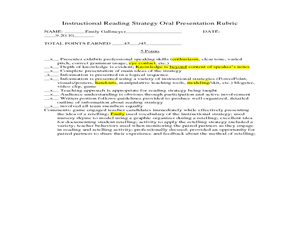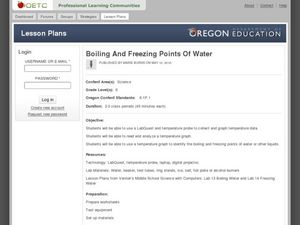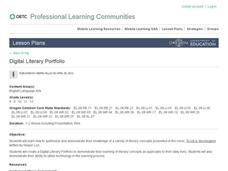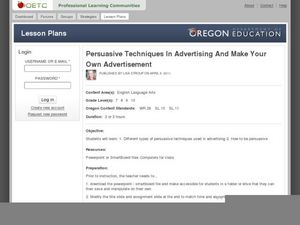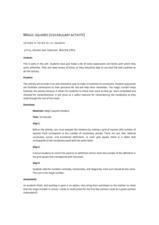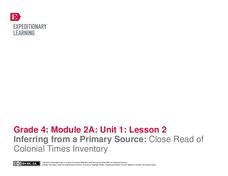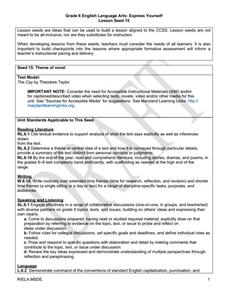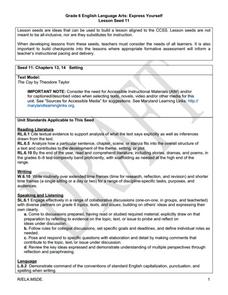Curated OER
Money
Work on money-related vocabulary with this practice worksheet. With words such as "auditors," "mortgage," and "bankrupt," the activity prompts ESL students to choose the correct term based on the context clues of the sentence. These ten...
Curated OER
Even
Delve into the more nuanced parts of grammar with this ESL worksheet. Learners work with the word "even" in ten different questions, which provide sentences in different contexts. They choose whether or not to use the word, and in what...
Curated OER
Spelling: Online or Printable
Aspiring spellers determine which word is spelled correctly in 33 sets of multiple choice options. They can check their own answers if they complete the exercise online. You can also print it out for hard copy use.
Curated OER
"Who am I?"
Pupils of all ages work in pairs to find information about themselves and record a digital "Who am I?" They observe and measure each other, write clues, and illustrate before having others guess who is described.
Curated OER
The Princess's Point of View
Everyone wants to be part of a royal family. Let your pupils experience the privilege of royalty by rewriting the story The Frog Prince from the point of view of the princess. While the story line remains the same, perspective is bound...
Curated OER
Retelling
Explore language arts by completing a story worksheet in class. Readers will identify the importance of plot, setting, and character while they write their own short story. They also retell their story to a classmate and participate in a...
Curated OER
Our Town
With the songs "My Hometown" by Bruce Springsteen and "Allentown" by Billy Joel, learners examine external versus internal conflict. When they have finished the first part of the lesson, they create their own poem (or song) about the...
Curated OER
Boiling and Freezing Points of Water
Challenge your sixth graders with this lesson about the freezing and boiling points of water. In these activities learners graph temperature data, read and analyze information, and identify the freezing and boiling points of water and...
Curated OER
Digital Literary Portfolio
Scholars choose between a variety of digital media in order to present literary concepts from To Kill a Mockingbird. Technology-heavy, the lesson requires that your class has computers, Microsoft Office Suite, and other devices such as...
Curated OER
Persuasive Techniques in Advertising and Make Your Own Advertisement
Are you looking for a collaborative and fun way to teach persuasion? This could be a great resource for you! After reviewing advertising techniques and searching for examples of propaganda, have your class create and present their own...
Curated OER
Double-Entry Journal Writing
Introduce your learners to the concept of a double-entry journal. Talk about how to connect with the text and model an example for them. Using whatever literature you are working with, have scholars choose a quote and make their own...
Curated OER
Our Town: Using Song Lyrics in the Classroom
Bruce Springsteen’s “My Hometown” and Billy Joel’s “Allentown” motivate young lyricists to craft poems about their own home town. Groups compare the two songs, identifying details, symbols, and conflicts. Individuals then picture a place...
Curated OER
Magic Squares Vocabulary: Catcher in the Rye
Magic squares make learning fun! Seriously! Learners use the given square to review vocabulary terms from J.D. Salinger's Catcher in the Rye. The 16 vocabulary terms are not divided by chapter, they represent the whole book. As learners...
Curated OER
Opposite Grapevines
There are really only four basic moves in this line dance. Those dance moves are: grapevine, slide, marching, and then dipping and clapping. Each 8-count is repeated twice, for a total of a 64-count dance. The unique addition to this...
Curated OER
Number TIC TAC TOE
Working in pairs, young mathematicians will practice number identification with a game of tic-tac-toe. Supplies needed: two 3x3 grids with numbers 1-9 in random order, and two different colored crayons. Player 1 will choose and read a...
EngageNY
Inferring from a Primary Source: Close Read of Colonial Times Inventory
Teach your class about colonial America through an examination of primary documents. First though, start vocabulary notebooks for content-specific and academic vocabulary. Pupils can keep this record during the entire module. Once this...
Curated OER
Express Yourself Lesson Seed 15: Theme
Build understanding of theme with an activity designed for The Cay and the Common Core. Small groups or pairs use graphic organizers to determine themes, find and record related details from the text, and formulate theme statements. In...
Curated OER
Express Yourself Lesson Seed 11: Setting
Encourage your learners to examine the setting in Theodore Taylor's The Cay. Pupils work in small groups to put together a description of the setting before reading two more chapters of the book. They use their double-entry journals to...
Achievement Strategies
CCSS Unit Design Template for PE
From baseball and tennis to capture the flag and four-square, here is a great document that will help you design your next unit on a sport-related activity.
Macmillan Education
Get Thinking
Have a go at this exercise in thinking by asking thinkers to think about thinking, of what they think of, and what they think about. The worksheets in the packet provide much food for thought.
Education Outside
Animal Homes in the Garden
First graders journey to the school garden to examine the habitats of garden animals. Using the provided graphic organizer, kids locate and sketch a critter and its habitat before returning it to its home.
Practical Money Skills
Student Loans
If your learners are college bound, they'll need a lesson about student loans and personal finance before they step into their dorm room. A four-day lesson guides high schoolers through the process of budgeting for college, as well as...
EngageNY
Adding and Subtracting Expressions with Radicals
I can multiply, so why can't I add these radicals? Mathematicians use the distributive property to explain addition of radical expressions. As they learn how to add radicals, they then apply that concept to find the perimeter of...
Caucus 101
Linkage Institutions: Interest Groups: Option A
How are elections really run and won? Learn about special interest groups, super PACs, and lobbyists with an engaging lesson about the caucus process. Young voters research specific interest groups and analyze their part in previous and...







